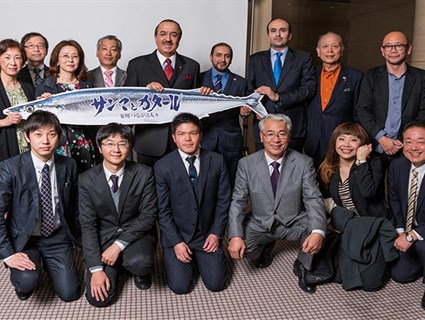Japanese Onagawa Town Holds Event in Recognition of Qatar's Support

Tokyo/Information Office/ 09 March 2016/Japanese Onagawa Town in cooperation with Japanese Heisei media company organized an event on the occasion of the screening of a documentary film entitled 'Sanma and Qatar' to highlight the mega-project, 'MASKAR', a multifunctional fishery processing plant carried out by Qatar Friendship Fund (QFF) in Onagawa, Japan. The event, which commemorates the fifth anniversary of the catastrophic earthquake and tsunami that struck northeastern Japan in March 2013, was organized in recognition of Qatar's efforts and endeavors in extending a helping hand to the Japanese people after the disaster. It was attended by HE Qatar's Ambassador to Japan Yousef Mohamed Bilal, political dignitaries, businessmen and Mayor of Onagawa Suda Yoshiak along with senior director at Heisei Yumiko Suda, among others. The documentary movie entitled ‘Sanma and Qatar’ showed the people's efforts in recovering from the disastrous aftermaths of Tsunami 2011 with the support of Qatar. The 2011 Great East Earthquake and Massive Tsunami devastated many coastal towns in Japan's Tohoku region that lead to the critical damage of the fishing industry. Prior to the disaster Onagawa was renowned for its Saury "Samna" catches, but as a result of the catastrophe 85% of the fishery infrastructure was destroyed. This is particularly alarming considering that over 60% of the people of Onagawa are employed in the fishing industry. Reviving the fishing industry is now key to reversing this, not only for Onagawa but also for nearby towns for whom 'Maskar' offers a beacon of hope. The reconstruction of the fishing industry in Tohoku was a major priority for the Qatar Friendship Fund (QFF) to create job opportunities, rebuild the local economy and lay the foundations for a sustainable future. One fish-processing plant built in 2012 by QFF in Onagawa, Miyagi Prefecture, kick-started redevelopment in the local area. When the MASKAR multi-functional fish-processing facility was built using a donation from QFF, Onagawa was still profoundly damaged. There were no other buildings along Onagawa's coast except for MASKAR, to the extent that visiting missions would use the plant as a landmark for driving direction from far away. MASKAR is surrounded by 10 other new fish-processing plants and their accompanying buildings. More than 7,500 fishing industry workers now use MASKAR to select, freeze and store their catch every day. The effectiveness of MASKAR has played an important role in the value of the fishermen's catches. The plant saw a record 8.3 billion Japanese yen in transactions between April and December 2014, which has already exceeded the 7.7 billion yen benchmark of 2010, before the disaster.

